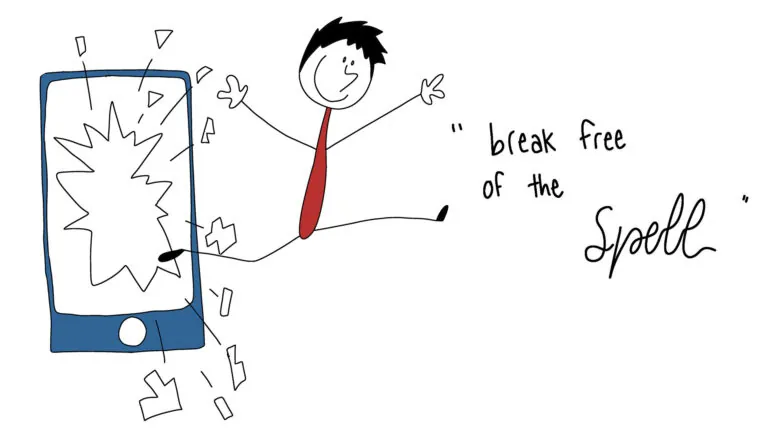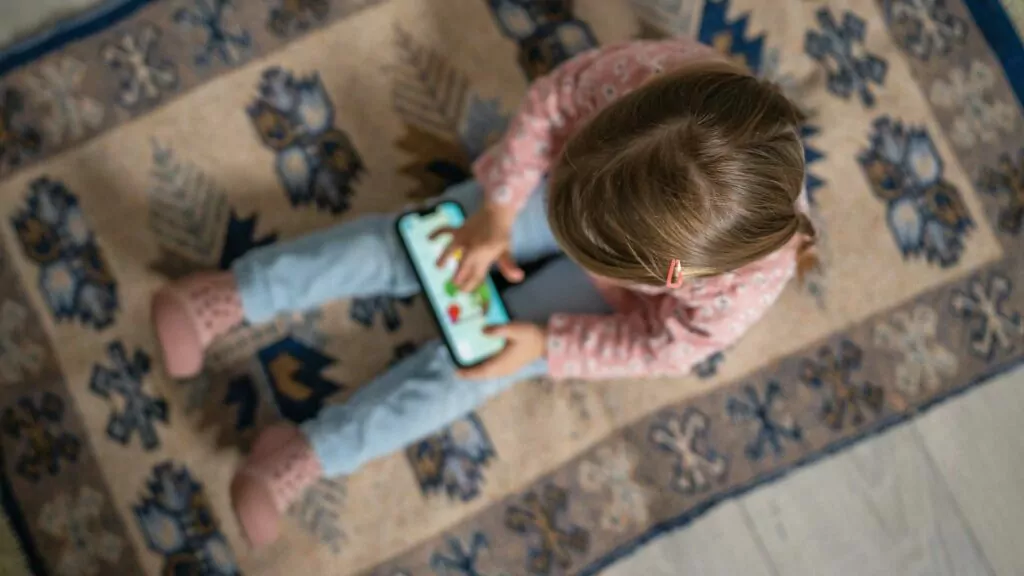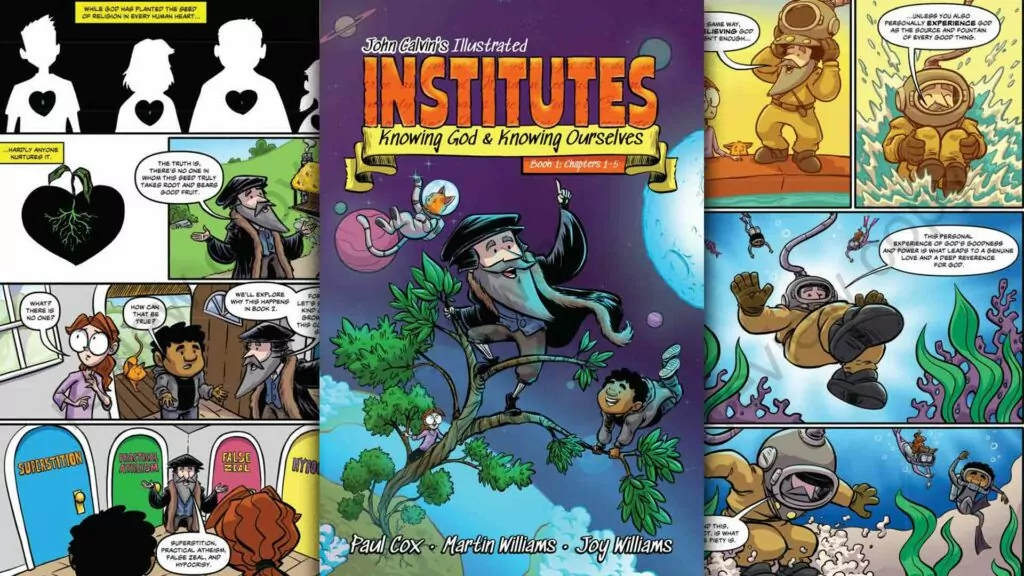What we learned by stepping away from our phones for 10 days
*****
We were hoping for 200 to sign up.
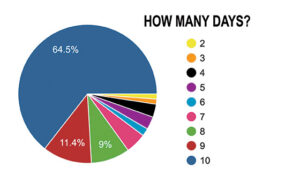 Turns out a lot of us were ready for this – more than 900 registered for RP’s July 21-30 screen-fast challenge, and we heard about others who joined the fast without signing up. Safe to say, over a thousand people across the country came together to put our screens in their place.
Turns out a lot of us were ready for this – more than 900 registered for RP’s July 21-30 screen-fast challenge, and we heard about others who joined the fast without signing up. Safe to say, over a thousand people across the country came together to put our screens in their place.
That is amazing!
But maybe it shouldn’t have been surprising. God’s people know He wants us to make good use of the time He’s given us, and we know that our phones too often have us wasting moments that turn into minutes, which can add up to lost hours each week. We needed to hit the reset and get back control. So how’d we all do? Of the 160 responses we received, three-quarters managed to stay away from their screens for 9 days or better. They also shared stories, tips on what worked, what they found toughest, suggestions on how we could do this even better next time, and what got them most excited about the fast.
And we’re very excited to share their thoughts with you.
EYE OPENING
One term kept popping up in the feedback – “eye-opening.”
“It was a very humbling experience for me. I am a fairly busy person as it is, between nursing school, 2 kids, and running a household, but I will say that the amount of hours I still managed to waste away doing mindless scrolling or pointless video-watching was disconcerting, to put it lightly.”
“I thought I was pretty good about staying off my phone, but I really had to remind myself not to pick it up. I’ve only had a phone since October, and already it has become such an integral part of my life.”
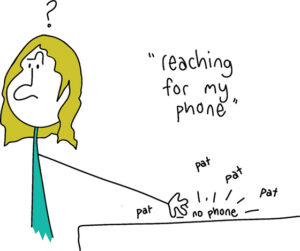 “The screen-fast started while we were away on vacation, and what a blessing this was! At first, I thought it would be easy; after all, I had books to read, family to visit with, and a beach calling my name. I had deleted all of my social media accounts a couple of years ago. I thought I barely used my phone in comparison to others. Boy, was I wrong. I never realized how often I was reaching for my phone, oftentimes for no specific purpose other than to fill time or cure boredom! Looking at the weather, reading the news, playing games – my phone sucked me in even without social media being present! The screen-fast has truly been a blessing. It reminded me of the value of being present, of shared experiences, of all the little moments that I would have missed out on had I been scrolling on my phone. I learned that it’s okay to have moments of quiet, stillness, and even boredom! Sometimes, it is in these quiet moments of being in creation that God speaks the loudest: His power in the wind and waves, His beauty in the flowers, His tenderness, care, and grace towards me in that He used these moments to calm any anxieties that were lurking within me. Thank you, Reformed Perspective, for encouraging this experience!”
“The screen-fast started while we were away on vacation, and what a blessing this was! At first, I thought it would be easy; after all, I had books to read, family to visit with, and a beach calling my name. I had deleted all of my social media accounts a couple of years ago. I thought I barely used my phone in comparison to others. Boy, was I wrong. I never realized how often I was reaching for my phone, oftentimes for no specific purpose other than to fill time or cure boredom! Looking at the weather, reading the news, playing games – my phone sucked me in even without social media being present! The screen-fast has truly been a blessing. It reminded me of the value of being present, of shared experiences, of all the little moments that I would have missed out on had I been scrolling on my phone. I learned that it’s okay to have moments of quiet, stillness, and even boredom! Sometimes, it is in these quiet moments of being in creation that God speaks the loudest: His power in the wind and waves, His beauty in the flowers, His tenderness, care, and grace towards me in that He used these moments to calm any anxieties that were lurking within me. Thank you, Reformed Perspective, for encouraging this experience!”
“My oldest (11) had a hard time sticking to the screen-fast and caved 3 times. Hard to believe how much of a pull a screen has on a person! Makes me want to live in the Little House on the Prairie times, where screens just weren’t available and outside play was their entertainment.”
“I just itched to check social media and would find myself comforted by just holding my phone close, even though there was nothing to look at. I realized that I don’t like this about myself.”
“It was well needed and brought my screen time down to about 15-30 minutes a day from my usual 2-2.5 hours. I hope to keep my screen time down as much as I can because I’m so much more productive and observant of the world around me when I’m not on it.”
TOGETHER IS EASIER
Some participants didn’t know anyone else doing it, even with a thousand across the country involved. Those with friends and family joining in found it much easier.
“My sister and I challenged each other and we both finished (almost) successfully. We both started reading again after having lost the habit of reading and gained the habit of scrolling. I’m very happy to be reading again and I noticed how much I can get done with the time I used to waste. I will definitely be more careful with my screen time in the future.”
“I found that since my family didn’t participate, it was hard to maintain self-control when others were using their devices.”
“I did it with my wife – we found that especially when we were both free in the evening, we would be more productive, but also, we spent more quality time with each other. It made me realize how often I would just reach for my phone when I was bored or between tasks; it feels great to have kicked that habit.”
“We had family come for summer holidays and they willingly partook (kids too)! Fishing and bike rides at 7 am rather than cartoons…win! We enjoyed creation so much more, especially in the evenings. I loved having it as a challenge; it kept me more accountable and successful. Thanks for doing this for us!”
DON’T ALWAYS NEED INSTANT ANSWERS
“I have a tendency to google everything as it comes up in a conversation, and not being able to was refreshing, and kept me more focused on the person instead of the topic.”
“The thing that surprised me was how often I had the compulsion to Google a question that popped into my mind, or research the proper way to do something, or make a quick purchase of something I remembered I needed. I realized that technology is very helpful, but also there is benefit in taking a pause, making a shopping list, or asking a friend rather than Google when I have a gardening question. My 10-year-old said that she found more space to be creative when the computer and TV was off. ”
“My kids didn’t miss their own screen time, but they realized how much they asked me to look things up for them. Not having immediate access to information is not such a bad thing.”
FAMILY-LIFE
Less screens = more life was evident on the home front.
“We had meals at the kitchen table instead of in the living room while watching YouTube.”
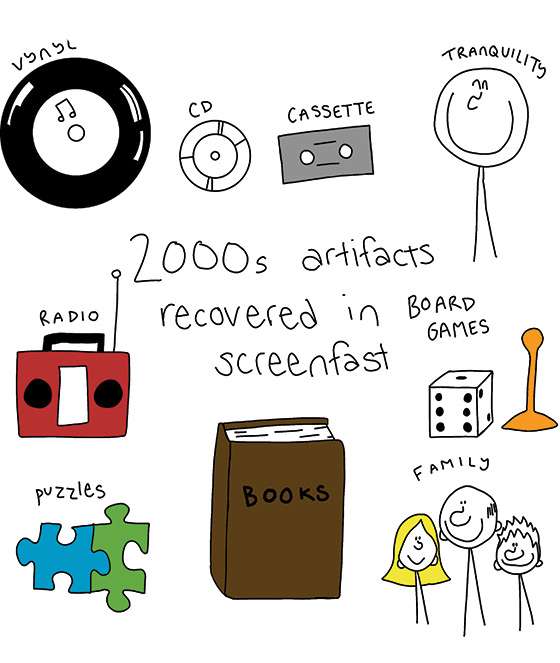 “I noticed our kids really improved in playing for longer periods of time. If they complained they were bored, I would suggest they try an activity for 20 minutes, and often 1 hour later they would still be busy.”
“I noticed our kids really improved in playing for longer periods of time. If they complained they were bored, I would suggest they try an activity for 20 minutes, and often 1 hour later they would still be busy.”
“We did do more different things together when we didn’t spend as much time playing games or watching videos on the TV or computer. It forced my kids, in particular, to stretch their imagination a bit to come up with more different things to do. The intermittent cries of ‘I’m bored!’ were met with, ‘Well, then you need to find something to do!’ My kids had always been good at keeping busy, but it was good for them to exercise those creative muscles, and remind us all of all the options that we have, both on and off the screen.”
“The main things I’ve been struggling with were not wasting time on my phone (e.g., games, videos), not using my phone during time with my toddler, and not using my phone in bed, so I focused on those and was able to significantly improve in those areas. It definitely helped with spending quality time with my son without distractions so that I was more focused on him and his needs.”
“It helped me reconnect with my wife. Instead of sitting on the couch consuming content in the evenings, we went for more walks and had more time to talk about what was going on.”
“There was a lot more interacting happening throughout the family, and everyone seemed happier. It felt like a lot less fighting happened.”
“It was easier to connect and interact with my kids. I realized how much I used my phone when they were awake even though I thought I was being conscious of not using it while they were awake.”
“My children (4 and under) appeared less needy, and I think it is because I was more focused on what was going on around me.”
“Because I was screen-free, my kids didn’t even ask for screen time. My 18-year-old daughter loved it. She noticed she was far more creative and read more books (which is her natural habitat) than when she had a screen to distract her.”
“It was harder than I thought it would be. Especially right before bed. But not being on screens before bed allowed more time for my wife and I to spend time together.”
WANTING TO BE AN EXAMPLE
“Helped me to realize that in a screen-filled world, as a parent and adult, I am an example to my daughter and the younger generation as to how much a phone has a hold on me.”
“It was better when the children are around not to have YouTube on in the background; I could be more present with them, even while doing dishes. I think I will continue to try to save my Podcast/YouTube listening for when the children are in bed.”
“I am disappointed that I didn’t do this sooner. My oldest kiddo is 7 and I feel like my phone has been a large part of her life. It’s my job now, as it was before, to teach her, along with my other kids, how to use this technology properly and not to use and abuse it. I am striving to use it less and less, and more for emergencies, or for the free time that I’ve allowed myself to use it.”
DEVOTIONS
Many mentioned how helpful the fast was for their devotions, making sure time with the Lord didn’t get crowded out by inconsequentials.
“Just made me realize I need to read my bible FIRST……not after the morning’s scroll!”
“I found I actually had time to do my devotions in the morning, even if my kids were up. Before I had been grabbing my phone if I wasn’t going to have perfect uninterrupted time for devotions.”
“My morning devotions improved immediately! When you don’t have your phone in the morning you really do need to replace it with something. ”
READING
In addition to the Bible, many, many other books (and at least one magazine) were read too. One person shared: “More reading in 10 days than the last 3 years!”
 “I definitely did more reading! I haven’t picked up a fictional book in a long time because, as a busy mom, I found it a ‘waste of time’ to read fiction…. somehow scrolling on my phone every evening to have some mindless down time was better?! I don’t think so. I enjoy that time in the evening to relax for a bit, but it is much better spent reading an engaging book!”
“I definitely did more reading! I haven’t picked up a fictional book in a long time because, as a busy mom, I found it a ‘waste of time’ to read fiction…. somehow scrolling on my phone every evening to have some mindless down time was better?! I don’t think so. I enjoy that time in the evening to relax for a bit, but it is much better spent reading an engaging book!”
“I read the whole RP magazine front to back in the moments that I would pick up my phone when I was bored.”
“The biggest difference for me was dedicating more intentional time to read. I managed to finish 3 of Jane Austen’s novels. I’m thrilled to add them to my recommended reading list!”
“…relearned how to read a book in under a day. Been through so many books.”
“…for downtime, instead of watching a show every night like I normally do, I read more and had more conversations with my family as well.”
BETTER MENTAL PLACE
Sociologist Jonathan Haidt is convinced that social media is fueling this generation’s teen mental health crisis, but doing without Facebook and Instagram isn’t just good for the kids.
“In regards to social media particularly, the fast made me realize that while social media can be enjoyable and good, it’s also almost like a subconscious burden to try to ‘keep up’ with everyone and everything all the time. Being off of it for 10 days was really freeing and refreshing.”
“I… learned that when I’m anxious, instead of running to Google to try to ease my anxiety, I should run to God in prayer.”
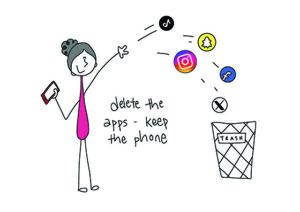 “It felt good, in the sense that my brain didn’t feel distracted by useless information coming in at a fast pace. I found I could spend time on my screen sorting photos, but I didn’t scroll Instagram. It took a few days to notice that my brain felt a little less full, and I felt totally focused on my life, instead of having a 20-minute binge session after lunch to be inundated with strangers’ lives. I did read more, during that after-lunch quiet time, and also before bed. My screen time didn’t interfere with family time, it was just something I would do to ‘wind down’ or ‘relax’ once kids were napping or in bed for the night. I didn’t miss it. One evening I did log on to find a recipe I’d saved on Instagram and ended up scrolling…I felt gross. It felt like I had to re-join the real world when I finally put my phone down, and it became very obvious to me how little value it adds to my life for the amount of time spent on the app.”
“It felt good, in the sense that my brain didn’t feel distracted by useless information coming in at a fast pace. I found I could spend time on my screen sorting photos, but I didn’t scroll Instagram. It took a few days to notice that my brain felt a little less full, and I felt totally focused on my life, instead of having a 20-minute binge session after lunch to be inundated with strangers’ lives. I did read more, during that after-lunch quiet time, and also before bed. My screen time didn’t interfere with family time, it was just something I would do to ‘wind down’ or ‘relax’ once kids were napping or in bed for the night. I didn’t miss it. One evening I did log on to find a recipe I’d saved on Instagram and ended up scrolling…I felt gross. It felt like I had to re-join the real world when I finally put my phone down, and it became very obvious to me how little value it adds to my life for the amount of time spent on the app.”
“One of the biggest things for me was not checking my work email on my phone. I didn’t realize how much head space that had been taking up! It was a big relaxant to have set hours to check only on my laptop.”
“My brain felt quieter. All those little moments where I would have quickly checked Facebook, or scrolled, to ‘relax’ were removed from my day and I didn’t realize how much they cluttered my mind. The screen-fast really helped me to be more aware of that, which will hopefully give me more control over those impulses to reach for my phone moving forward. My husband and I both did it and found ourselves going on more evening bike rides, having more chats, and just doing more quality time things than we did before. It was so refreshing, and I think we definitely feel more connected. I also had more focused time for devotions, and because I deleted many apps from my phone, I had no reason to pick it up and get distracted. I’m hoping to keep a lot of the habits enforced by the fast because I definitely need them, and life is better when your phone has less time in your hand!”
“What a beautiful challenge! My experience was that I suddenly became much more present: in my home life, my church life, and my friend life. It brought me closer to God in my devotional time, provided time for reflection, enabled me to read most of a book, and granted me a peace that I didn’t even realize was missing.”
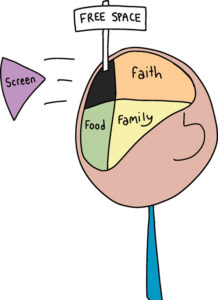 “I also felt less stress because I was not being inundated with news…. Although a person never thinks they are spending ‘that much’ time on their phone, it’s not just the physical act of scrolling or being on social media. It occupies mental space after you put the phone down. Your attention is divided and things you see and do on your phone inadvertently affect your mood and ability to focus throughout the day. You may be worrying about something you saw in the news and it will affect how you treat people around you, even if you cannot do anything about it, or it doesn’t even really affect you. You may be in the habit of checking your phone for notifications every few minutes (you’d be surprised how often you may do this) and it can make the simplest tasks take much longer than required, which will in turn make you feel frustrated. The less time you spend on your phone, the more wisdom you will use when you do pick it up. I noticed I was much less likely to scroll Instagram and more naturally inclined to listen to a sermon in the evening after the children were in bed. I was always feeling stressed about the time I thought I was spending on my phone, and appreciate the push to try just being on it less. It has certainly been an eye-opener for me!”
“I also felt less stress because I was not being inundated with news…. Although a person never thinks they are spending ‘that much’ time on their phone, it’s not just the physical act of scrolling or being on social media. It occupies mental space after you put the phone down. Your attention is divided and things you see and do on your phone inadvertently affect your mood and ability to focus throughout the day. You may be worrying about something you saw in the news and it will affect how you treat people around you, even if you cannot do anything about it, or it doesn’t even really affect you. You may be in the habit of checking your phone for notifications every few minutes (you’d be surprised how often you may do this) and it can make the simplest tasks take much longer than required, which will in turn make you feel frustrated. The less time you spend on your phone, the more wisdom you will use when you do pick it up. I noticed I was much less likely to scroll Instagram and more naturally inclined to listen to a sermon in the evening after the children were in bed. I was always feeling stressed about the time I thought I was spending on my phone, and appreciate the push to try just being on it less. It has certainly been an eye-opener for me!”
“I found myself more content with everything, and could easily enjoy hobbies I had long forgotten. I found myself thanking God for the little moments and was reminded of the blessings He has given me.”
“I listen to a lot of podcasts and audiobooks while doing housework, and not doing that for 10 days made me realize that always having something on to listen to does not help me be present with my family. It was good to have the quiet space, and engage in some spiritual warfare by taking thoughts captive that are not obedient to Christ. I’m not going back on any social medias because I’ve broken the spell that says I will miss out or not be in-the-know…. They take up too much brain space that is needed for more important things.”
BETTER SLEEP
“I feel I slept better because of no screen time before bed, and I read a biblical book in the morning instead of going on Facebook.”
“…I had to get used to sleeping without going on my phone right before bed. I had dreams that I could remember in the morning!”
MORE PRODUCTIVITY
Ten minutes here, and ten minutes there, can really add up in time wasted, but also in time put to good use.
 “I somewhat reluctantly signed up for the screen-fast, as my wife and kids were participating, but reflecting on it now, I can see God’s hand working through them and the screen-fast. I spent more time reading the Bible and additional study material, and more time in prayer and reflection. I was able to think more clearly after the first few days, as the cheap distraction of screens was gone. This gave me time and focus to think through issues at work which I’ve been contending with for around a year, and come to difficult decisions there that I had perhaps been avoiding.”
“I somewhat reluctantly signed up for the screen-fast, as my wife and kids were participating, but reflecting on it now, I can see God’s hand working through them and the screen-fast. I spent more time reading the Bible and additional study material, and more time in prayer and reflection. I was able to think more clearly after the first few days, as the cheap distraction of screens was gone. This gave me time and focus to think through issues at work which I’ve been contending with for around a year, and come to difficult decisions there that I had perhaps been avoiding.”
“I am working on a baby blanket for my son (knitting) and I was able to set a minimum for how much I wanted to complete on it daily, a minimum that seemed impossible to me before, and I was actually able to meet the minimum no problem.”
“My husband participated as well, and has continued to not go onto social media. I found it most difficult to not pop onto social media when waiting for the mundane things, like water to boil/meat to cook. I would often go onto social media in these moments; at first it felt odd to not scroll, but I quickly would start to tidy the kitchen in these moments, so the result is a cleaner house 🙂 and I did spend more time in God’s Word, and reading short devotions here and there instead of picking up my phone.”
“The first few days I noticed a significant amount of improvement in my productivity. Without doom-scrolling on my phone, I was able to head out for a walk, dust off my book, and go to bed on time. I was able to spend a little more time with family and friends. Rather than watching a movie with my girlfriend after a long day, we decided to head out for a drive to enjoy the summer weather, which was awesome! I was able to spend more time reading my Bible before bed by keeping my phone in the kitchen, and used a good old-fashioned alarm clock to wake me up.”
DOWNSIDES
While there was lots to love about putting our phones aside for a time, there were some downsides too.
“…I also found that it made me less likely to organize get-togethers if I had to phone people up instead of fire off a quick text; the kids and I ended up not doing as many things with friends or neighbors. I did make a few nice phone calls to people, since I was conscious of phoning instead of texting.”
“I had a hard time not listening to my audiobooks and podcasts. I was more available for my kids (when I listen to audios, I have noise-cancelling headphones), but I had less ambition to do projects around the house that I would normally listen to something while doing. I also missed watching something at the end of a long day, but did enjoy my walks, and more reading of a physical book compared to an audio.”
“I felt very disconnected from my family without WhatsApp group messaging! I was available via regular messaging, but it turns out that one-to-one messages are a rarity… if you aren’t on the group chat there isn’t much to say. My 10-year-old son said: ‘It affected me because you didn’t know as much about what other people in our family were doing.’ Keeping email off my phone (both work and personal) will stay. It was very restful to not be constantly checking emails and going down rabbit holes in the moment.”
“I missed seeing update posts from friends on Instagram or Facebook. For example, there was a family wedding and I wanted to go on social media to see some photos. I felt that I was missing out, not being able to do this. I came to the conclusion that family and friend updates can be one of the fun things about social media.”
LASTING IMPACT?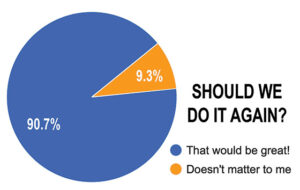
How can we apply the lessons learned? Some are planning on “having periodic screen-fasts in the future.”
“…our family has decided to do a ‘modified fast’ for the rest of the summer and this was initiated by our children. Our stage of life (everyone working and/or attending post-secondary) means we don’t often have large blocks of time together but it was nice to spend more time in the evening sharing about our days and chatting.”
“Going forward, I’ve used the settings in my phone to limit my time on certain apps. I’ve also cut out around half of the influencers I follow on Instagram so that I’m only following people I learn from (news, DIY, Christian content, etc.)”
“Now that I’m done, I’m way more okay with leaving my phone in a bag or even at home.”
“Going forward, I will be deleting social media apps from my phone. Thank you for prompting us to give this challenge a try! I think that it’s fair to say that it will be life-changing.”
“I intend to do this screen-fast again in the future and strongly encourage anyone who has not done it to do so, and aim to grow in service of our gracious God.”
“I enjoyed the screen fast, and hope to do it again, and include more of my family members.”
“From the get-go, I decided not to try 10 days but figured I could do 5. And you know what? It was easy! And it was good for me. I know I spend too much time on social media and playing games on my phone. I plan to do it again on a regular basis.”
TIPS
The most common tip mentioned was to delete social media apps from our phones. Another idea was to buy an alarm clock instead of using your phone to wake up. Here’s more…
“…eliminate phones from your bedroom. Reading my Bible nightly is way more likely to happen when Instagram is more than a click away. That Christian influencer’s advice might be insightful, but God’s Word will not return empty (Isaiah 55:11).”
“I …have continued a few habits I built, like delaying the first phone check of the day.”
“I found freedom also in separating my phone from bedtime and wake time. This led to more prayer time. I think I was allowing the phone, instead of faith, to ease me into my day and I’m looking forward to continuing [my new] practice.”
“We realized that phones are still an essential part of our lives but that the ‘social media’ part of it doesn’t need to be so extensive. A regular phone call to someone can be so enjoyable and truly connecting. I have since called many people and just had a good chat. Hoping to keep this method up. I will keep my notifications ‘OFF.’”
“I made a rule for myself a couple years ago, that at the start of every day, I may not look at my phone until after my breakfast devotions were finished. It really helps to be very disciplined about not falling into bad habits. Make rules and stick to them. I also tell myself that it’s okay to be bored.”
Cartoons by Hannah Penninga.







